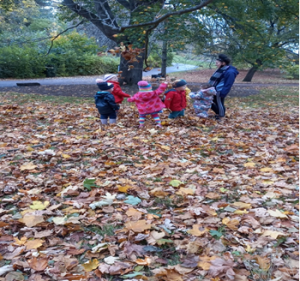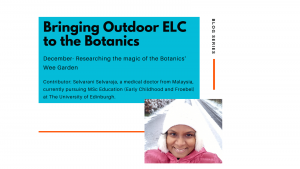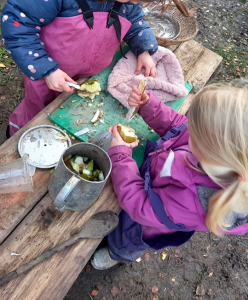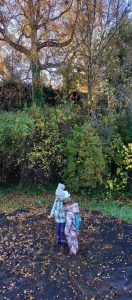Thrive Outdoors blog series: researching the magic of the Botanics’ Wee Garden
This month for the fourth instalment of our Botanics Blog we spoke with Selvarani Selvaraja, a medical doctor from Malaysia, currently pursuing MSc Education (Early Childhood and Froebel) at The University of Edinburgh. Selvarani has been involved in this project as part of the research team, led by Dr. Lynn McNair, Head of Cowgate Under Fives Centre in Edinburgh, Scotland, and a Lecturer in Early Childhood Practice and Froebel / Research Fellow at the University of Edinburgh. In this blog Selvaraja explains what she has observed from a research point of view on the Botanics outdoor nursery journey.
Bringing outdoor early childhood education to the Royal Botanic Gardens in Edinburgh has been an exciting journey thus far, observing young children engaging in nature has been both fulfilling and experiential. The evolving dynamics amongst children and adults in the Wee Garden (the Botanic Garden’s outdoor nursery space), is indeed intriguing. The benefits children reap through actively learning in nature is tremendous. This has become a greater priority as the issue of climate change looms ahead of us. Children engaging in nature creates an awareness of self in relationship with their surroundings. The right pedagogy, guiding young minds in a nurturing space, prepares them for the task ahead of them, learning to live harmoniously with every being on earth.
The nurturing space in this context is our Wee Garden. A green space nestled within the bustling city of Edinburgh, the Botanics brings people together to foster inclusive communities. As such, community engagement is vital in building connections between people, plants and each other. Hence, providing an outdoor learning space for young children in the Botanical Gardens promotes inclusivity, recognises young minds as part of the community and nurtures the love for nature in them.
It offers a space for children to move freely, to run and to play, in their own time at their own pace, all within the Wee Garden site. Frolicking in the mud, finding fairies under the tree, making leaf necklaces, all in a space that they can call their own. The Botanical Gardens are no longer for ‘display’ purposes only but also for direct engagement with early childhood nature education, which can only be seen as a positive path towards inclusivity. As an example, on a cool autumn morning, a group of children were throwing dry leaves up in the air in the main garden space, and watched in glee as the leaves scattered down aided by the gust of wind. Visitors to RBGE, including an elderly couple observed in awe as the scene of play unfolded before their eyes. They were smiling and seemed to be enjoying the whole scenario of the children’s nature play as they continued their walk. Therefore, we can see that the role of Botanics as a nurturing nature space to provide young minds a learning opportunity, can also promote the visibility and inclusivity of children; re-affirming their role as a part of a larger community.
 Perception and belief of a holistic pedagogical practice by the adults and educators in the outdoor space, plays a vital role in determining the quality of nature play. A Froebelian pedagogical approach towards outdoor learning, places utmost importance on ‘freedom with guidance’ based interaction with the children. By this we mean, enabling the child’s individual enquiry while gently expanding their horizons.
Perception and belief of a holistic pedagogical practice by the adults and educators in the outdoor space, plays a vital role in determining the quality of nature play. A Froebelian pedagogical approach towards outdoor learning, places utmost importance on ‘freedom with guidance’ based interaction with the children. By this we mean, enabling the child’s individual enquiry while gently expanding their horizons.
Engagement with nature through the Frobelian lens has always honoured direct experience and a sense of ‘being’ in the surroundings. Children learn in nature rather than simpy about nature. A child needs opportunities to experiment, explore and discover with sensitive, attuned adults who support children but do not take over their play. Children choose where they want to go and for how long, away from constant adult interruption. Respect is given to free play motivated by the children. This differs greatly from the segmented curriculum of dividing learning into subjects, heavily influenced by adult-led instructions. A Froebelian approach enables children to make connections within their learning.
In the Wee Garden, most children find their own way to invest their time in play. For instance, during one of the observation sessions, two children aged 4 and 5, named O and L (for narration purposes), started cutting apples (that had fallen into the garden overnight) with razor shells. They put the cut bits into a pot in the mud kitchen and pretended to cook apple soup. They were engaging in this activity for more than 15 minutes of uninterrupted free play whilst having a conversation on what the soup was going to taste like. At this point, a well-meaning adult decided to intervene and invited the children to make a leaf boat. O and L just looked up briefly from the cutting chore and shrugged their shoulders softly, indicating their disinterest in the leaf boat activity and continued their apple cutting task for another 15 minutes. This was a groundbreaking moment of realisation for the adults where the children created their own learning environment through uninterrupted free play; reminding us that the role of adult should be attuned to the children’s needs, offering guidance where necessary, otherwise observing from afar.
Image: making apple soup
This Frobelian quote,
‘It seems to me that such continuous guidance on the part of the adult must take away the spontaneity in childish play’ (Froebel in Liebschner, 2001:68) best describes the holistic approach of the Froebelian pedagogy, which has become more relevant in influencing the perception and belief of the adults in the outdoor learning space.
Through the lens of Froebelian pedagogy we can provide an enriching learning experience for children by enabling their unity and connection to nature, which opens up tremendous benefits in children’s development.
Bringing outdoor early childhood education into the Botanics is a journey of discovery, one that develops through a nurturing space, such as our ‘Wee Garden’. The research so far has demonstrated that the pedagogy and practice of the adults in the space can expand, or limit, the imagination and creativity of the learning taking place there. We must strive to create an outdoor learning and play environment in which children are the leaders of their space, in turn fostering a deeper connection with nature in years to come.
Further reading
- University of Edinburgh Froebelian study: Froebel in Childhood Practice
- MSc Education, Early Childhood & Froebel
- The Froebel Trust: https://www.froebel.org.uk/
- Read last month’s blog
Stay tuned as we continue this blog series sharing the next part of this exciting journey on Friday the 21st of January!
Enjoy this blog? Then keep an eye for the next blog in this series where both the up’s and downs of piloting a new outdoor ELC in a botanical garden will be shared as well as the key learnings along the way!
Join in the conversation or just chat with us at:
- Facebook @ThriveOutdoorsScot
- Twitter @Thrive_Outdoors
- Instagram @thrive_outdoors
- or by email to amy@inspiringscotland.org.uk
Celebrating 5 years of intandem
Inspiring Scotland’s Head of Development and Partnership, Julia Abel, reflects upon the impact of intandem mentoring as the programme celebrates its fifth birthday.
We all need consistent, trusting relationships. For young people who have care experience, these relationships can sometimes be lacking. The long-term presence of a trusted, supportive adult can make all the difference to the trajectory of their lives.
We’re celebrating five years of intandem, Scotland’s national mentoring programme. Funded by the Scottish Government and delivered by Inspiring Scotland, the programme connects young people and volunteer mentors to establish meaningful, supportive and long-lasting relationships.
Since 2016, intandem has supported young people who are looked after at home on a Compulsory Supervision Order (CSO). While being in care is often linked to social disadvantage, children and young people looked after at home have the poorest outcomes of all young people in Scotland, through no fault of their own. intandem supports these young people to develop positive relationships with a trusted adult role-model. Weekly mentoring provides space for these relationships to flourish.
intandem is a community-based mentoring programme, with meetings taking place outside of the school environment. Over the last five years, intandem has trained 733 volunteers and coordinated 450 matches. With over 3,500 children and young people in Scotland currently living at home under a CSO, it is vital that we continue to invest in them with mentoring support, so these children don’t fall through the cracks.
We know intandem works. The average match lasts 17 months, providing young people with stability and long-term support. Mentored young people consistently report a range of positive outcomes, including increased self-esteem (62%), increased community engagement (64%) and improved friendships (64%). With Covid-19 prompting an increase in feelings of anxiety and isolation, it’s more crucial than ever that all young people have the opportunity to form meaningful relationships.
With intandem, inspiring Scotland is committed to helping Scotland #KeepThePromise, a pledge to embed the voices of care-experienced young people when making decisions about the Scottish care system. As part of this commitment, intandem facilitates a Young Person’s Forum, where care-experienced young people can speak on the issues closest to them. intandem staff are also currently working with a care-experienced individual, to help shape the work of intandem as we look to the future.
intandem is made possible by the commitment of its funder, Scottish Government. It also depends on the dedication of volunteers and the commitment of the programme’s twelve charity partners, who work tirelessly to coordinate matches across Scotland. These charities are committed to matching more young people with mentors, to ensure every young person has the opportunity to thrive.
intandem has a bold and ambitious vision – that Scotland’s children, young people and families can stay together to build and maintain positive, loving relationships. intandem is currently embedded in 19 Local Authorities and aspires to expand even further. By continuing to grow, intandem can help Scotland #KeepThePromise to all care-experienced infants, children, young people, adults and their families – that every child grows up loved, safe and respected, able to realise their full potential.



